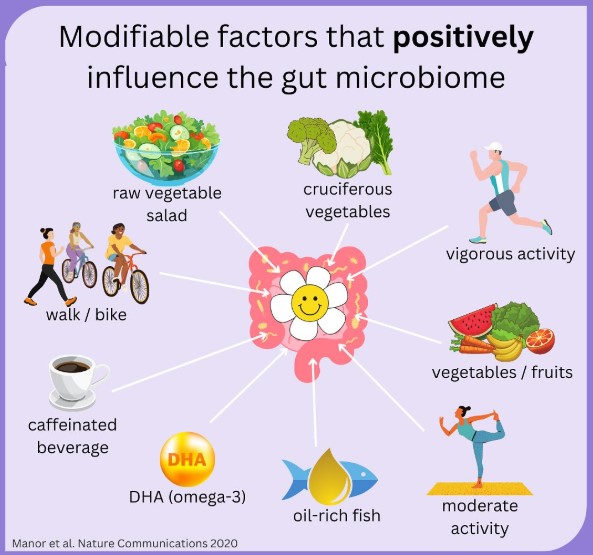When we think about health, we often focus on our heart, lungs, or brain. Yet, inside every one of us lives a thriving, invisible world that is just as vital: the human microbiome. This vast community of trillions of bacteria, viruses, fungi, and other microorganisms plays a powerful role in maintaining our well-being — influencing everything from digestion and immunity to mental health. In Lifestyle Medicine, nurturing this inner ecosystem is increasingly recognized as a cornerstone of disease prevention and health optimization.
What Is the Microbiome?
The term “microbiome” refers to the collective genome of all the microorganisms living in and on the human body, especially concentrated in the gut. Far from being passive passengers, these microbes interact closely with our own cells, regulating critical functions like nutrient absorption, immune defense, and even hormone production. A diverse and balanced microbiome is associated with robust health, while disruptions to this system — often referred to as dysbiosis — have been linked to a wide range of chronic conditions, including obesity, diabetes, cardiovascular disease, inflammatory bowel disease, and depression.
The Role of Antibiotics: A Double-Edged Sword
Antibiotics have undoubtedly saved countless lives by treating bacterial infections effectively. However, their impact on the microbiome has raised significant concerns. Research by Ramirez and colleagues (2020) emphasizes that antibiotics are major disruptors of gut microbiota, causing shifts in microbial diversity and abundance that can persist long after treatment ends. These disruptions weaken the gut barrier, impair immune function, and can set the stage for long-term health complications.
Moreover, the impact of antibiotics is not uniform. According to Patangia et al. (2022), different antibiotics can vary in how profoundly they alter the microbiome. Broad-spectrum antibiotics, for example, tend to inflict greater damage by indiscriminately wiping out both harmful and beneficial bacteria. Repeated or inappropriate use compounds this problem, leading not only to persistent dysbiosis but also to increased vulnerability to infections like Clostridioides difficile.
Microbiome and Antimicrobial Resistance
An emerging and alarming issue linked to microbiome disruption is the spread of antimicrobial resistance (AMR). As Nhu and Young (2023) highlight, when antibiotics disturb the normal gut flora, they create an environment where resistant strains can thrive and exchange resistance genes. This not only threatens individual health but also poses a broader public health risk by fueling the global rise of antibiotic-resistant infections — a crisis that could render once-treatable diseases deadly once again.
Nurturing the Microbiome: A Lifestyle Medicine Perspective

In Lifestyle Medicine, maintaining microbiome health involves practical, evidence-based strategies:
- Prioritize a Plant-Rich Diet: Diets rich in fiber, fruits, vegetables, legumes, nuts, and whole grains feed beneficial gut bacteria. Fermented foods like yogurt, kefir, sauerkraut, and kimchi can also enhance microbial diversity.
- Use Antibiotics Judiciously: Only take antibiotics when medically necessary, and always complete the prescribed course to minimize risks of resistance and dysbiosis.
- Manage Stress: Chronic psychological stress can alter the gut microbiome. Mindfulness, exercise, social connection, and restorative sleep are powerful tools for both mental health and gut health.
- Stay Active: Regular physical activity has been shown to promote a more diverse and resilient microbiota, contributing to systemic health benefits.
- Avoid Unnecessary Antimicrobials: Beyond prescription antibiotics, be cautious about overuse of antibacterial soaps and household products, which can disrupt microbial balance.
Conclusion
Our relationship with the trillions of microbes within us is a profound and delicate one. Protecting the microbiome isn’t just a scientific curiosity — it’s a powerful act of self-care with implications for lifelong health. As Lifestyle Medicine practitioners and advocates, understanding and promoting microbiome-friendly habits empowers us to prevent disease at its roots and foster true, holistic wellness.
The next time you sit down for a meal, lace up your shoes for a walk, or consider taking an antibiotic, remember: you’re not just caring for yourself — you’re tending to an entire world within.
For more information and to join our community, visit our website and explore our courses and resources.
